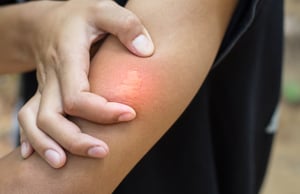 There are many wonderful reasons to live in south Louisiana, but the bugs likely aren't one of them. Our warm, semi-tropical climate is favorable to pests, which is why Louisiana is known for its seemingly endless supply of bugs and insects like mosquitoes, fire ants, ticks and more.
There are many wonderful reasons to live in south Louisiana, but the bugs likely aren't one of them. Our warm, semi-tropical climate is favorable to pests, which is why Louisiana is known for its seemingly endless supply of bugs and insects like mosquitoes, fire ants, ticks and more.
Although these insects are an integral part of our ecosystem, their bites and stings can lead to allergic reactions in some individuals. Understanding these reactions is crucial for effective prevention and timely treatment.
Types of Allergic Reactions
Allergic reactions to insect bites and stings can range from mild to severe, with two primary types: local and systemic reactions. Local reactions can be uncomfortable, but they are generally harmless and resolve within a few days. Local reactions typically result in symptoms like:
- Swelling
- Redness
- Itching and pain around the bite or sting area
Systemic reactions occur in individuals who are severely allergic to stinging insect venom. Reactions are more serious and can affect the entire body. Symptoms can include:
- Hives
- Swelling in the face, throat or tongue
- Difficulty breathing
- Dizziness
- Rapid heartbeat
- Nausea
- Anaphylaxis – a potentially life-threatening condition that causes the immune system to release a flood of chemicals that can cause the body to go into shock. Signs and symptoms include a skin rash, weak pulse, vomiting and nausea.
How to Prevent Allergic Reactions
Prevention is key to avoiding allergic reactions to insect bites and stings. Some practical measures include:
- Using insect repellents containing DEET or picaridin
- Wearing long-sleeved shirts, long pants and closed-toe shoes when working outdoors, especially in wooded areas, as well as avoiding bright-colored clothing that can attract insects
- Staying away from areas where insects are abundant
- Keeping doors and windows screened as well as promptly repairing any holes or cracks to help prevent insects from entering your home
How to Respond to Allergic Reactions
In the event of an allergic reaction, it is crucial to act quickly. For mild local reactions, over-the-counter antihistamines, hydrocortisone creams or cold compresses can provide relief. For severe systemic reactions, including difficulty breathing or signs of anaphylaxis, immediate medical attention is necessary. Administering epinephrine through an autoinjector, if available, can be lifesaving while awaiting emergency medical assistance.
Insect Bites and Stings in Children
It's important to recognize that children, being more vulnerable, can easily fall victim to insect bites and stings. Safeguarding your child's well-being and ensuring their comfort involves understanding their potential reactions to these bites and taking preventive measures. For more information, consult with a physician at Lane Pediatrics.




